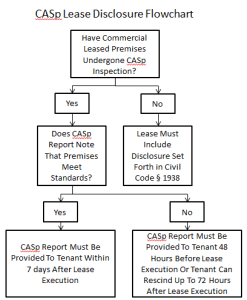By: Theodore K. Klaassen and William M. Miller
Buchalter Retail Leasing and Development Group
In 2012, the California Legislature passed Senate Bill 1186 in an effort to reduce the number of disability access lawsuits faced by business owners and to spur compliance with disability access laws. The bill, codified in California Civil Code § 1938, required that every commercial lease form include a statement as to whether the premises leased had been inspected by a Certified Access Specialist (CASp), and if so, whether the premises was determined to meet all applicable construction-related accessibility standards.
Hoping to encourage even greater compliance with accessibility standards, the California Legislature recently passed Assembly Bill 2093, which markedly increases disclosure requirements for commercial landlords. Specifically, the Legislature hoped that increasing the amount of information given to tenants about a commercial property would lead to more understanding by such tenants and prompt the lease parties to take proactive steps in reaching compliance with disability access laws. Regardless of the intent, AB 2093 gives landlords more and different obligations with which they must comply.
The threshold question in determining how AB 2039, which amends Civil Code § 1938, may impact commercial landlords is whether or not the premises being leased have undergone a CASp inspection. Note that every lease for a commercial premise in the State of California must state whether or not the subject premises have undergone a CASp inspection.
If the premises have not undergone a CASp inspection, then any lease for the premises must include the following additional disclosure:
“A Certified Access Specialist (CASp) can inspect the subject premises and determine whether the subject premises comply with all of the applicable construction-related accessibility standards under state law. Although state law does not require a CASp inspection of the subject premises, the commercial property owner or lessor may not prohibit the lessee or tenant from obtaining a CASp inspection of the subject premises for the occupancy or potential occupancy of the lessee or tenant, if requested by the lessee or tenant. The parties shall mutually agree on the arrangements for the time and manner of the CASp inspection, the payment of the fee for the CASp inspection, and the cost of making any repairs necessary to correct violations of construction-related accessibility standards within the premises.”
If the premises have undergone a CASp inspection, the next question is whether the report from the CASp inspection notes the need for modifications or repairs to correct violations of construction related accessibility standards.
If the CASp inspection report indicates that the premises meet applicable standards, then the landlord must provide a copy of the current disability access inspection certificate to the tenant within seven days after lease execution.
If the CASp report indicates the need for modifications, then the Landlord must provide the CASp report to the tenant prior to the execution of the lease agreement with an agreement that the tenant keep the report confidential except as necessary to make repairs and modifications. If the report is not provided to the tenant at least 48 hours prior to lease execution, then the tenant can rescind the lease based upon information contained in the report up to 72 hours after lease execution. Here is a flowchart:

The new law also states that the repairs or modifications necessary to correct violations shown in the CASp report are presumed to be the responsibility of the landlord, unless otherwise mutually agreed upon by landlord and tenant. For both landlords and tenants, it is imperative that leases effectively address who is required to take actions to meet accessibility standards.
If you have any questions about the impact of AB 2093 on a specific transaction, do not hesitate to contact Ted at (415) 227-3500 or [email protected] or Will at (213) 891-5287 or [email protected] or the Buchalter lawyer with whom you normally consult.
Theodore Klaassen is an Attorney in the Firm’s San Francisco office. He can be reached at 415.227.3500 or [email protected].
William Miller is a Shareholder in the Firm’s Los Angeles office. He can be reached at 213.891.5287 or [email protected]